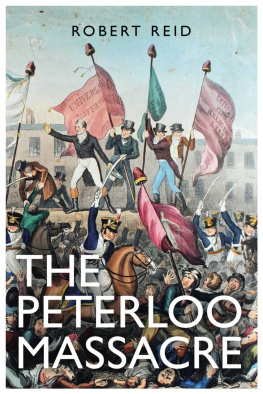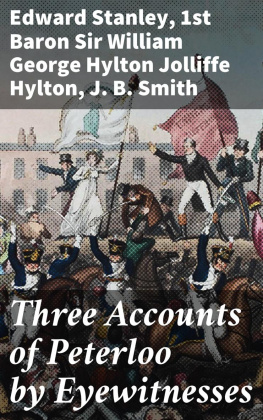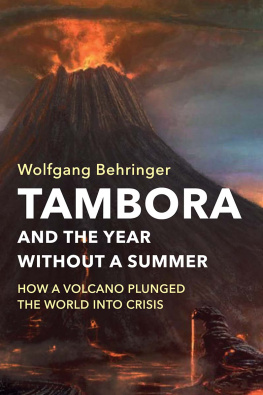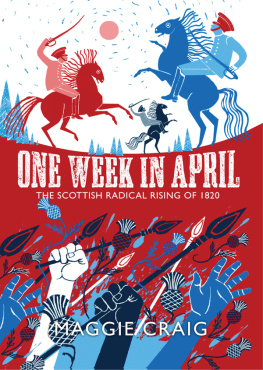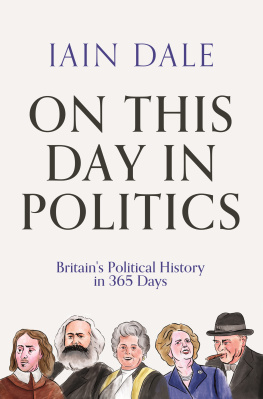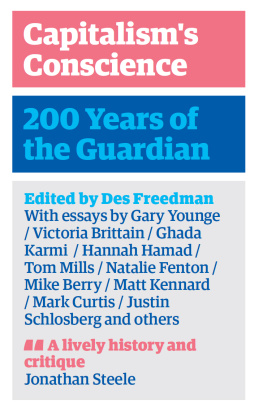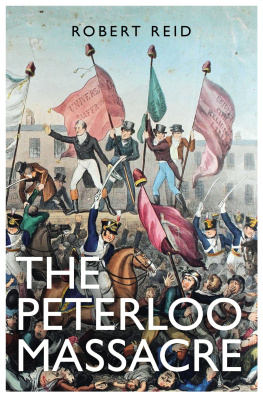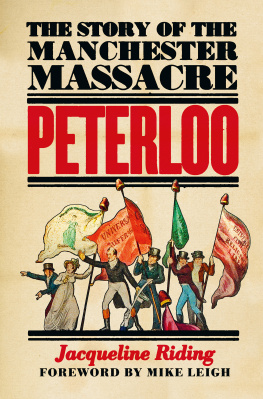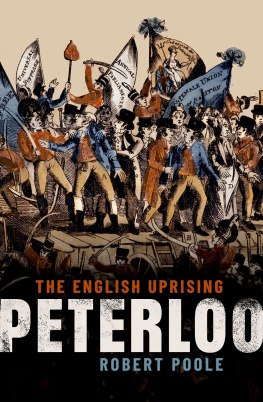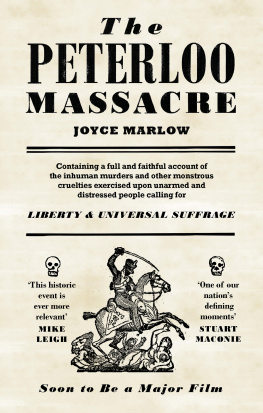CONTENTS
About the Book
A compelling account of one of the darkest days in Britain's social history.
On 16 August 1819, a strong force of yeomanry and regular cavalry charged into a crowd of more than 100,000 workers who had gathered on St Peters Field in Manchester for a meeting about Parliamentary reform. This violent, startling event became known as Peterloo, one of the darkest days in Britains social history.
The Peterloo Massacre provides a revealing narrative account of the events leading up to Peterloo, starkly describes the actions of that fateful day, and examines its aftermath. It offers a new perspective on the political and military activities of the time, and shows how the very nature of society was powerfully influenced by irreversible technological change: a pattern that, two-hundred years later, still has relevance in understanding the forces shaping our world today.
About the Author
Robert Reid was born in 1933 in Yorkshire. He was awarded a state scholarship to Oxford University, where he read Chemistry. After taking part in post-graduate research in South Africa and Canada, he completed a PhD in Physical Chemistry at Cambridge University, and then joined the science department of BBC Television. He directed The Sky at Night, presented by Patrick Moore and, in the early 1960s, made the documentary The Building of the Bomb in which he interviewed Robert Oppenheimer. From 19671970 he was the editor of Horizon, and in 1970 was made Head of Science and Features at BBC Television. During this time he was responsible for the 13-part series The Ascent of Man presented by Jacob Bronowski. He later wrote the script for another memorable programme, The Voyage of Charles Darwin.
After leaving the BBC, Reid joined Sir Antony Jay, John Cleese and Michael Peacock at Video Arts, a production company specialising in training films for business and industry, where he was responsible for the science output of the company. Robert Reid was the author of several books on science-related subjects, including Tongues of Conscience: War and the Scientists Dilemma, written in 1969. His biography of Marie Curie, published in 1974, was adapted for television and has been translated into many languages. The Peterloo Massacre, originally published in 1989 to mark the 170th anniversary of Peterloo, was his last book. He died in 1990.
ALSO BY ROBERT REID
The Spectroscope
Tongues of Conscience: War and the Scientists Dilemma
Marie Curie
Microbes and Men
My Children, My Children
Land of Lost Content
The Peterloo Massacre
R OBERT R EID

MAPS
INTRODUCTION
The conflict at the focal point of this book is a unique incident which stains the long path leading to the emancipation of the people of Britain. The name Peterloo is well-known, but what it involved is becoming less familiar to successive generations. The intermingling of characters involved in the Luddite Revolt with those intimately concerned with Peterloo provided a sure guide to the contemporary sources; these supply key evidence of the events leading to the Massacre. In chronicling these events I have laid emphasis on the critical role played by technological change. In parts, I have repeated some ideas concerning technology and its signal power from a previous book, Land of Lost Content, which dealt with the Luddite Revolt. I have done this because I believe these ideas are important to an understanding of the conditions leading to Peterloo, and the lessons to be learnt from it and, no less, to an understanding of the problematical forces shaping our present civilisation.
I am deeply in the debt of J. E. Stanfield for his invaluable advice which helped shape my manuscript. Equally, I must thank Dr Robert Glen, not only for his informed comments, but also for the use I was able to make of his scholarly study, Urban Workers in the Early Industrial Revolution. Of books dealing with events leading to Peterloo, I have found Dr Donald Reads Peterloo, the Massacre and its Background to be the most informative and the most reliable.
I am grateful to the librarians of the British Library, Chester Library, Chester Record Office, Chethams Library, Manchester, Colindale Newspaper Library, Doncaster Borough Council Archives Department, Balby, Doncaster Central Library, Exeter Library, the John Rylands University Library of Manchester, the London Library, Manchester Central Library, the National Horseracing Museum, Newmarket, the Public Record Office, the RIBA, the Royal Institution and Stockport Public Library for the generous help they have all unfailingly given.
1
The Soldiers Return
In the autumn of 1816, the senior British officer who, the previous year, had commanded the second Guards division at Waterloo, stood one day on a beautifully contoured patch of ground above the Norman tower on the edge of an English village and reconnoitred the unhindered view south. He took particular note of the fields to his front leading down to Campsall church, and to the rolling, long-settled countryside beyond. Behind him was a substantial stone-built mansion. From its windows, over its walled gardens, there was a view in every direction as commanding as that which the soldier contemplated. The historic name of the hill, Campsmount, described adequately enough the sites military potential.
The general, Sir John Byng, had had a military career which had not been short of either experience or incident. He had many times served under Wellington, had been wounded more than once in military encounters, had on one occasion in the Peninsula in 1813 personally charged through to plant the colours of the 31st Regiment behind enemy lines, and had been knighted before he even reached the field of Waterloo.
The modern visitor to Campsmount can still extract from the view but with difficulty what so engrossed Byng. The generals aspect to the south was one of unblemished rural beauty. But today, there is a striking addition. Some distance beyond the patchwork fields of corn and grass still descending to the Norman church tower, rises an incongruous hulk: a prominent red-brick Victorian scab to which, over many years, have been added vast asbestos-clad structures, warehouses, winding gear and coal shutes. This is the coal mine at Askern. The nineteenth-century South Yorkshire town of the same name which spread as the pits productivity grew, stands alongside, its houses in the new smokeless age, no longer pushing out the coal fumes which for decades blackened their walls.
The panorama from Campsmount provides a vivid example of how the demands of nineteenth-century technology overwhelmed both the rural English landscape and its economy, enriching the nation and transforming forever the way of life of its inhabitants.
The purpose of General Byngs visit to this hillside, paradoxically, was to discover a place where he could be sure to be free of the sight which today assaults the visitor. He had just come from a district where the dominant image that of the process of the transformation of Britain was too evident and too brutal to his sensitivities. In 1816, from this South Yorkshire vantage point, any sign of the metamorphosis was invisible. And the fact was, that the indisputable military advantages and defensive capabilities of Campsmount were of no interest whatever to him. Still fully employed as a lieutenant general in an England no longer at war, he had come temporarily at least to seek his personal peace here.

